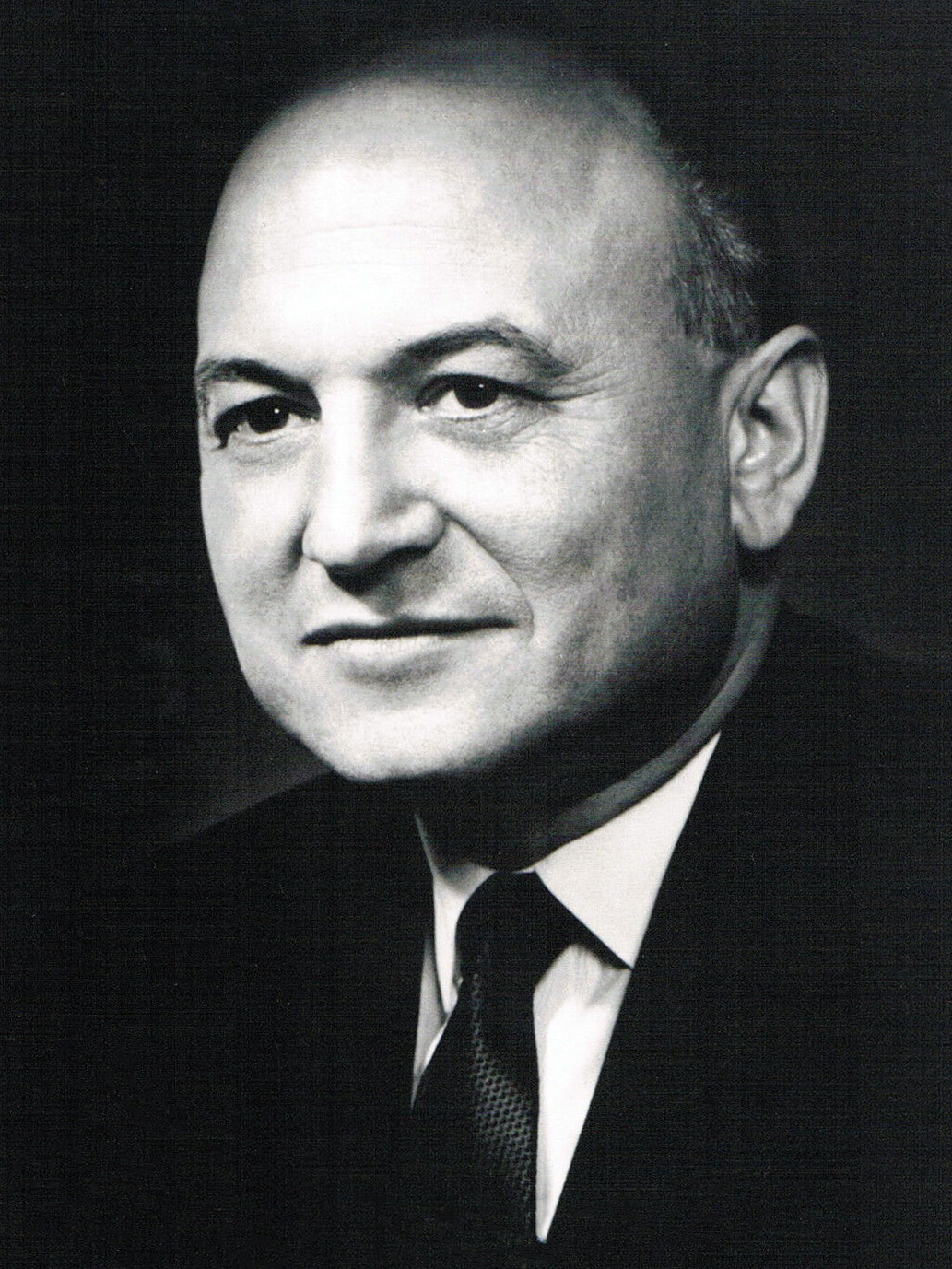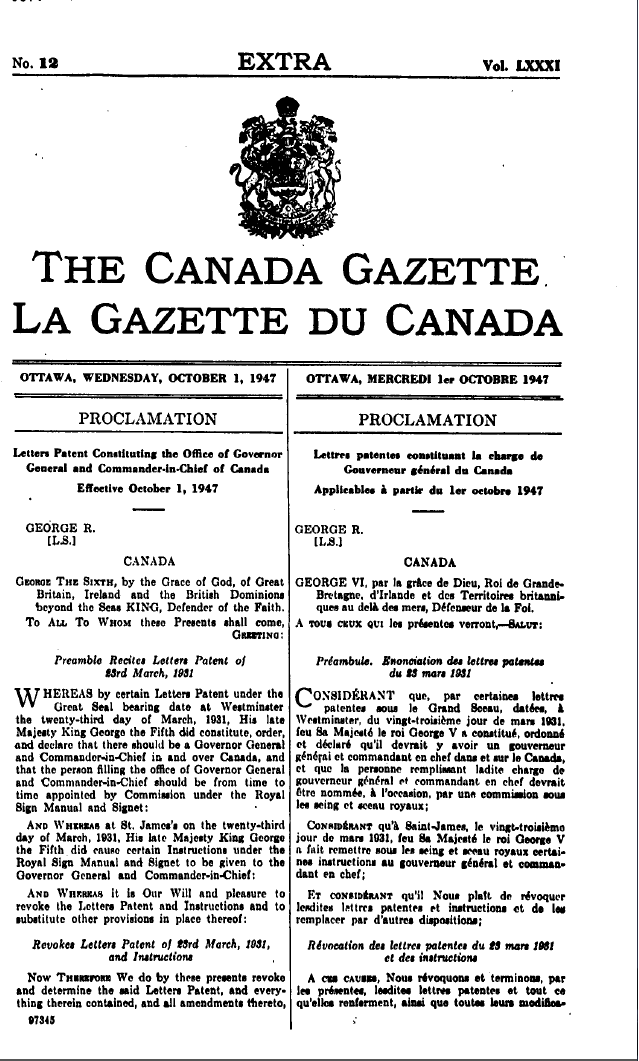|
Governor General's Warrant
Governor General's Special Warrants () are documents authorizing Canada's President of the Treasury Board to spend money appropriated by Parliament In modern politics and history, a parliament is a legislative body of government. Generally, a modern parliament has three functions: Representation (politics), representing the Election#Suffrage, electorate, making laws, and overseeing .... The Governor General may also issue a special warrant which allows the government to spend funds without an appropriation from Parliament. A special warrant may only be issued when money is "urgently needed" after Parliament has been dissolved and until sixty days after the dates set for the return of election writs. Until 1997, when an act sponsored by Peter Milliken received royal assent, special warrants were available whenever Parliament was not is session, including adjournments and prorogations. Milliken had introduced similar bills since 1989 in response to the use of special ... [...More Info...] [...Related Items...] OR: [Wikipedia] [Google] [Baidu] |
Canada
Canada is a country in North America. Its Provinces and territories of Canada, ten provinces and three territories extend from the Atlantic Ocean to the Pacific Ocean and northward into the Arctic Ocean, making it the world's List of countries and dependencies by area, second-largest country by total area, with the List of countries by length of coastline, world's longest coastline. Its Canada–United States border, border with the United States is the world's longest international land border. The country is characterized by a wide range of both Temperature in Canada, meteorologic and Geography of Canada, geological regions. With Population of Canada, a population of over 41million people, it has widely varying population densities, with the majority residing in List of the largest population centres in Canada, urban areas and large areas of the country being sparsely populated. Canada's capital is Ottawa and List of census metropolitan areas and agglomerations in Canada, ... [...More Info...] [...Related Items...] OR: [Wikipedia] [Google] [Baidu] |
President Of The Treasury Board
The president of the Treasury Board () is a minister of the Crown in the Canadian Cabinet. The president is the chair of the Treasury Board of Canada (a committee of Cabinet in the Privy Council) and is the minister responsible for the Treasury Board Secretariat, the central agency which is responsible for accounting for the Government of Canada's fiscal operations. The president of the Treasury Board has been Shafqat Ali since May 13, 2025. History and overview As a ministerial position, the office of Treasury Board president was created in the Cabinet in 1966 when the Treasury Board Secretariat became a full-fledged department of the federal government. Prior to 1966, the minister of finance was ''ex officio'' the chairman of the Treasury Board, as the Secretariat was part of the Department of Finance since Confederation (1867). The Secretariat is a central agency and the administrative arm of the Treasury Board. Technically, the board is a Cabinet committee of the Pri ... [...More Info...] [...Related Items...] OR: [Wikipedia] [Google] [Baidu] |
Parliament Of Canada
The Parliament of Canada () is the Canadian federalism, federal legislature of Canada. The Monarchy of Canada, Crown, along with two chambers: the Senate of Canada, Senate and the House of Commons of Canada, House of Commons, form the Bicameralism, bicameral legislature. The 343 members of the lower house, the House of Commons, are styled as Member of Parliament (Canada), ''Members of Parliament'' (MPs), and each elected to represent an Electoral district (Canada), electoral district (also known as a riding). The 105 members of the upper house, the Senate, are styled ''senators'' and appointed by the Governor General of Canada, governor general on the advice of the Prime Minister of Canada, prime minister. Collectively, MPs and senators are known as ''parliamentarians''. Bills may originate in either the House of Commons or the Senate, however, bills involving raising or spending funds must originate in the House of Commons. By Constitutional convention (political custom), cons ... [...More Info...] [...Related Items...] OR: [Wikipedia] [Google] [Baidu] |
Governor General Of Canada
The governor general of Canada () is the federal representative of the . The monarch of Canada is also sovereign and head of state of 14 other Commonwealth realms and resides in the United Kingdom. The monarch, on the Advice (constitutional law), advice of his or her Canadian prime minister, appoints a governor general to administer the government of Canada in the monarch's name. The commission is for an indefinite period—known as serving ''at His Majesty's pleasure''—usually five years. Since 1959, it has also been traditional to alternate between French language in Canada, francophone and English language in Canada, anglophone officeholders. The 30th and current governor general is Mary Simon, who was sworn in on 26 July 2021. An Inuk leader from Nunavik, Quebec, Simon is the first Indigenous peoples in Canada, Indigenous person to hold the office. As the sovereign's representative, the governor general carries out the day-to-day constitutional and ceremonial duties of th ... [...More Info...] [...Related Items...] OR: [Wikipedia] [Google] [Baidu] |
Writ Of Election
A writ of election is a writ issued ordering the holding of an election. In Commonwealth countries writs are the usual mechanism by which general elections are called and are issued by the head of state or their representative. In the United States, writs are more commonly used to call special elections for political offices. In some countries, especially in Canada,Haydn Watters"Many writs, no 'dropping': What the election call actually means" ''CBC News'', September 11, 2019 the process of issuing writs of election is referred to as "dropping the writ", likely derived from the phrase "drawing up the writ". In some parliamentary systems, the head of government (e.g. prime minister or premier) advises the head of state to issue writs of election (typically following the dissolution of parliament in order to hold general elections, but also for by-elections). The head of state usually reserves the right to refuse the request, in which case the head of government is required b ... [...More Info...] [...Related Items...] OR: [Wikipedia] [Google] [Baidu] |
Peter Milliken
Peter Andrew Stewart Milliken (born November 12, 1946) is a Canadian lawyer and politician. He was a member of the House of Commons of Canada from 1988 until his retirement in 2011 and served as Speaker of the House for 10 years beginning in 2001. Milliken represented the Ontario riding of Kingston and the Islands as a member of the Liberal Party. On October 12, 2009, he became the longest serving Speaker of the House of Commons in Canadian history. His Speakership was notable for the number of tie-breaking votes he was required to make as well as for making several historic rulings. Milliken also has the unique distinction of being the first Speaker to preside over four Parliaments. His legacy includes his landmark rulings on Parliament's right to information, which are key elements of parliamentary precedent both in Canada and throughout the Commonwealth. Milliken chose to stand down from Parliament at the 2011 federal election. His successor as Speaker, Andrew Scheer, was ... [...More Info...] [...Related Items...] OR: [Wikipedia] [Google] [Baidu] |
Prorogation In Canada
Prorogation is the end of a parliamentary session in the Parliament of Canada and the parliaments of its provinces and territories. It differs from a recess or adjournment, which do not end a session; and differs from a complete dissolution of parliament, which ends both the session and the entire parliament, requiring an election for the House of Commons in the bicameral federal parliament and the singular legislative chamber of the unicameral provincial parliaments. In the Canadian parliamentary system, the legislature is typically prorogued upon the completion of the agenda set forth in the Speech from the Throne and remains in recess until the monarch or governor general, in the federal sphere, or lieutenant governor, in a province, summons parliamentarians. From 2008 to present, prorogation has been the subject of discussion among academics, the Canadian public, and their political representatives. Mechanism It is, according to the constitution of Canada, the Canadian m ... [...More Info...] [...Related Items...] OR: [Wikipedia] [Google] [Baidu] |
Canadian Federal Legislation
Canadians () are people identified with the country of Canada. This connection may be residential, legal, historical or cultural. For most Canadians, many (or all) of these connections exist and are collectively the source of their being ''Canadian''. Canada is a multilingual and multicultural society home to people of groups of many different ethnic, religious, and national origins, with the majority of the population made up of Old World immigrants and their descendants. Following the initial period of French and then the much larger British colonization, different waves (or peaks) of immigration and settlement of non-indigenous peoples took place over the course of nearly two centuries and continue today. Elements of Indigenous, French, British, and more recent immigrant customs, languages, and religions have combined to form the culture of Canada, and thus a Canadian identity and Canadian values. Canada has also been strongly influenced by its linguistic, geograph ... [...More Info...] [...Related Items...] OR: [Wikipedia] [Google] [Baidu] |
Governors General Of Canada
The following is a list of the governors and governors general of Canada. Though the present-day office of the Governor General of Canada is legislatively covered under the ''Constitution Act, 1867'' and legally constituted by the ''Letters Patent, 1947'', the institution is, along with the institution of the Crown it represents, the oldest continuous and uniquely Canadian institution in Canada, having existed in an unbroken line since the appointment of Samuel de Champlain in 1627. Lieutenant General/Viceroy of New France, 1541–1627 Governors of New France, 1627–1663 Governors general of New France, 1663–1760 Governors of the Province of Quebec, 1760–1786 Following the Seven Years' War, control passed from France to Great Britain in the terms of the Treaty of Paris (1763), Treaty of Paris, creating the British Province of Quebec (1763–1791), Province of Quebec. Governors subsequently served under the Monarchy of the United Kingdom, British monarchy. Gover ... [...More Info...] [...Related Items...] OR: [Wikipedia] [Google] [Baidu] |
Royal Prerogative
The royal prerogative is a body of customary authority, Privilege (law), privilege, and immunity recognised in common law (and sometimes in Civil law (legal system), civil law jurisdictions possessing a monarchy) as belonging to the monarch, sovereign, and which have become widely vested in the government. It is the means by which some of the executive (government), executive powers of government, possessed by and vested in a monarch with regard to the process of governance of the state, are carried out. Evolution In most Constitutional monarchy, constitutional monarchies, prerogatives can be abolished by Parliament under its legislative authority. In the Commonwealth realms, this draws on the constitutional statutes at the time of the Glorious Revolution, when William III of England, William III and Mary II of England, Mary II were invited to take the throne. In the United Kingdom, the remaining powers of the royal prerogative are devolved to the head of the government, whic ... [...More Info...] [...Related Items...] OR: [Wikipedia] [Google] [Baidu] |
Emergency Laws
An emergency is an urgent, unexpected, and usually dangerous situation that poses an immediate risk to health, life, property, or environment and requires immediate action. Most emergencies require urgent intervention to prevent a worsening of the situation, although in some situations, mitigation may not be possible and agencies may only be able to offer palliative care for the aftermath. While some emergencies are self-evident (such as a natural disaster that threatens many lives), many smaller incidents require that an observer (or affected party) decide whether it qualifies as an emergency. The precise definition of an emergency, the agencies involved and the procedures used, vary by jurisdiction, and this is usually set by the government, whose agencies (emergency services) are responsible for emergency planning and management. Defining an emergency An incident, to be an emergency, conforms to one or more of the following, if it: * Poses an immediate threat to life, he ... [...More Info...] [...Related Items...] OR: [Wikipedia] [Google] [Baidu] |



